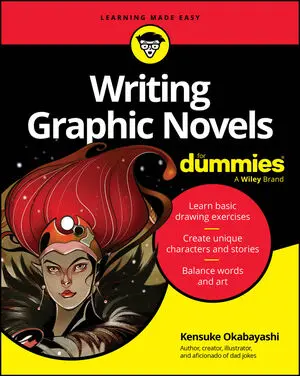Articles & Books From Writing
Turn your ideas into graphic novels with this step-by-step guide—including drawing exercises Writing Graphic Novels For Dummies walks you through the process of graphic novel creation step-by-step, guiding you through the process of developing ideas, concepts, and visuals to bring your unique stories to life.
Learn the skills you need to find sources, fact check, and write trusted articles Since the advent of the internet and the birth of social media, it has become difficult to wade through the massive amount of information out there. Every day we see—and believe—news articles that are released then debunked the very next day.
Cheat Sheet / Updated 10-01-2024
Writing a dissertation shouldn’t mean panicking. If you plan ahead and know how to structure your work, you’ll achieve fantastic results. And guess what? You might even enjoy yourself; writing a dissertation can be a highly rewarding experience. Follow this guide to producing the best possible dissertation.Obeying the Dissertation Rules and RegulationsKeep yourself on the straight and narrow when writing your dissertation, not only because illegal practices can land you and your university or college in trouble, but also because you’re likely to get found out and marked down.
Article / Updated 10-31-2023
The essay is to college writing what books are to educated people, what professors are to college teaching, and what wireless is to technology — they’re inseparable. The essay has been a major part of students’ academic life for more than 15 centuries. With such a storied history, the essay requirement isn’t likely to disappear before you graduate, which is why it's important to know how to start an essay.
Article / Updated 10-31-2023
Research papers are like a six-hour energy drink for your grade. They’re usually weighted a higher point value than other assignments because they require more work. And writing a few successful research papers each semester helps to boost your grade point average — and your academic confidence.Don't have time to read the entire article?
Cheat Sheet / Updated 10-24-2023
Romance is a top-selling fiction genre that includes historical and contemporary romance, paranormal and suspenseful romance, and more. Whether you’re an aspiring writer or just new to the genre, you’ll find practical information and tips here to help you along your writing journey.Reader expectationsWriting a romance is a creative process and far from formulaic.
Cheat Sheet / Updated 09-06-2023
Do you want to be the next best-selling author and dream up a new iconic character? Follow this handy Cheat Sheet, which breaks down the creative writing process into manageable tasks and helps you to develop your writing style and become a confident and accomplished writer.Gather your creative writing toolsAlways be prepared!
Article / Updated 08-04-2023
Your success in college has depended on problem-solving and figuring out how to navigate the academic maze. For example, you’ve successfully learned to register online, interpret syllabi, find your way around campus, and communicate with your professors. An additional requirement for your academic success is evaluating the credibility of sources you find to support your argument in your research paper.
Article / Updated 08-03-2023
Congratulations on earning your college admission. You’ve successfully fulfilled the requirements for 12 years of school, and you’re entering a world that defies the math you’ve learned. Grade 12 isn’t followed by Grade 13. It’s followed by an opportunity to change your life and your family’s life, and it begins with your first-year writing in college.
Cheat Sheet / Updated 08-02-2023
College researchers can’t have too many resource options for searching information. A researcher without a supply of resources is like a well without water and no source of quenching academic thirst.College researchers frequently need supplemental sources of academic research. Additional resources also include uncommon rules of grammar and usage and strategies for presenting research papers in the classroom.




